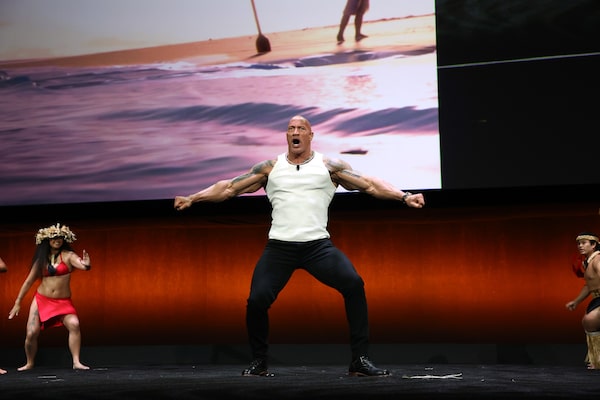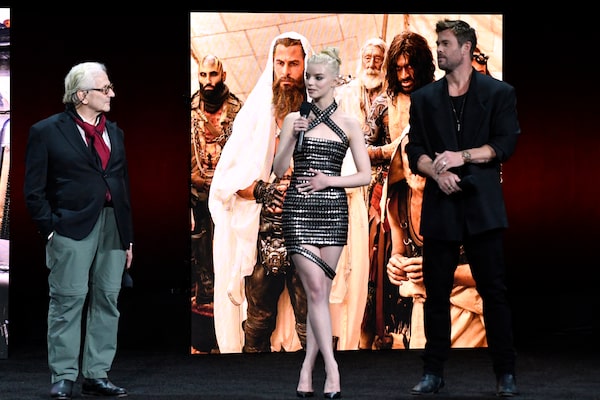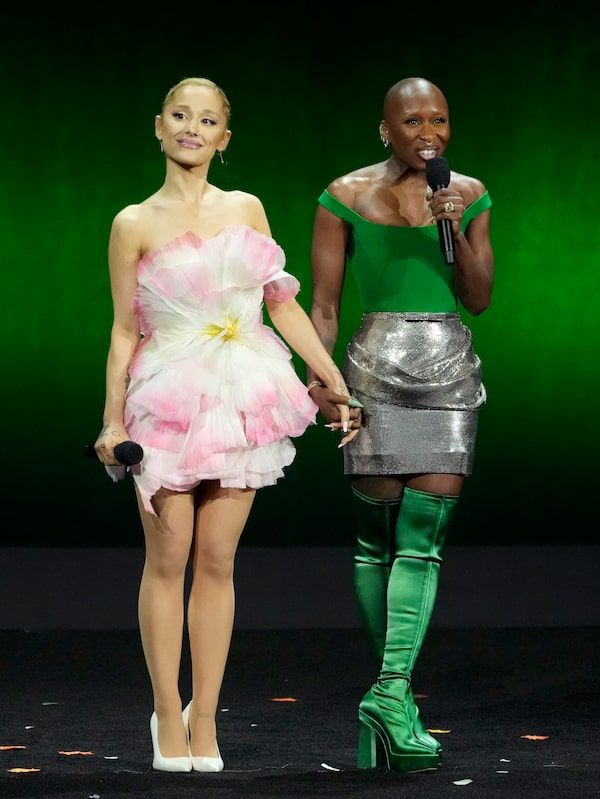
Chris Aronson, President of Domestic Distribution, Paramount Pictures arrives onstage dressed as a Gladiator during Paramount Pictures presentation at The Colosseum at Caesars Palace at CinemaCon 2024 in Las Vegas, Nev., on April 11.VALERIE MACON/Getty Images
If this year’s edition of CinemaCon was a movie, the four-day frenzy of film-industry boosterism hosted by the National Association of Theatre Owners in Las Vegas might be a nail-biting cliffhanger complete with a “To Be Continued ... ?” tag.
From the gigantic Colosseum stage inside Caesars Palace – where most (but curiously not all) of Hollywood’s major studios presented their coming slates – to the smoke-choked cigar lounges and haute sushi counters nearby, the CinemaCon chatter this past week was all about whether the industry can survive the next nine months in order to bask in the the allegedly glorious box-office bounty of 2025 and beyond.
By that point in time, the proselytizing goes, the studios will have bounced back from the self-inflicted injuries of last year’s writers’ and actors’ strikes to produce enough titles to sustain a robust theatrical marketplace. Those pesky, cost-conscious audiences who hibernated during the heights of the pandemic will come to realize that the convenience of streaming can only replace so much of the magic of moviegoing. And theatre owners who are dedicated members of NATO (yes, they’re aware of the unfortunate acronym) will have innovated their businesses – from concession to sound and image presentation – so remarkably that even the starchiest of couch potatoes will feel the irresistible lure of the lobby.
Hey, maybe even some of the movies will actually be good!
But that happily-ever-after all depends on studios, distributors and exhibitors actually coming out of the end of 2024 intact. This year’s release calendar – only about 100 wide releases, down 20 per cent from the prepandemic average – looks so thin that it might have been prescribed the Ozempic drugs so prized by its movie stars. North America’s largest exhibitor, AMC Theatres, is on the verge of bankruptcy, while its coolest, Alamo Drafthouse, is flirting with a sale.
And then there is the possibility that this year will close out with one or even two fewer studios existing in their current form, thanks to both Paramount and Warner Bros. Discovery becoming coerced participants in the sopping mergers-and-acquisitions fantasies of Wall Street.
The unsteadiness combined to ensure CinemaCon 2024 coursed with a grin-and-bear-it, fingers-crossed kind of energy.
Groundless optimism?

Dwayne Johnson performs onstage with dancers during the Walt Disney Studios presentation at CinemaCon in Las Vegas, Nev. on April 11.Jesse Grant/Getty Images
We’re only 20 months away from when James Cameron’s third Avatar film will surely save us all. But does anyone in charge have a plan to ensure that the industry makes it to that point?
You would think that a megacasino full of movie stars, studio executives, industry analysts and theatre owners might have a solution or two. Instead, the answer was a resolute, “Hang in there, kitty.”
”I think the big story of this CinemaCon is not that the business model has been broken, but that, as I look ahead, in 2025 and 2026, our industry is going to be healthy and robust and strong again,” Adam Aron, chief executive of AMC Theatres, told the crowd, without elaborating on what happens in the meantime.
Meanwhile, in his state-of-the-industry speech that formally opened CinemaCon, NATO president and chief executive Michael O’Leary noted that “inflection points like these are moments of opportunity,” before making the week’s ultimate Freudian slip by noting that the “future of this industry is limited, um, limitless.”
By the time that one exhibitor unironically quoted Robert Altman’s biting Hollywood satire The Player – confusing the knowingly empty slogan “Movies, Now More Than Ever” at the heart of the film with some sort of genuine rallying cry – there were enough apocalyptic signposts to fuel a dozen end-of-world thrillers (which theatres would naturally kill for).
The “truthiness” that crept into the confab didn’t help instill much confidence, either.
On CinemaCon’s first day, NATO unspooled a promo highlighting the “box-office success stories” of the past year, a reel that included such abject failures as Indiana Jones and the Dial of Destiny and The Flash. Later in the week, Universal Pictures executive Jim Orr proudly noted that in 2023, for the first time in two decades, the top three films of the year were “original films” – even though two of those three were The Super Mario Bros. Movie and Barbie, titles that didn’t exactly materialize out of thin air.
The next day, Paramount chief Brian Robbins boasted that the studio’s reboot of Mean Girls opened at No. 1 and “stayed there for three straight weeks!” That would indeed be a grand achievement, were it not for the fact that the film faced a dearth of competition in a deader-than-usual January – and that its tiny US$6.7-million haul in its third week marked the lowest-grossing No. 1 release in almost a year-and-a-half at the North American box office.
Big names missing in action

Australian director George Miller, left, speaks about his new movie "Furiosa: A Mad Max Saga" next to actors Anya Taylor-Joy and Chris Hemsworth during Warner Bros Pictures' "The Big Picture" special presentation featuring footage from its upcoming slate at The Colosseum at Caesars Palace during CinemaCon 2024 in Las Vegas, Nev., on April 9.VALERIE MACON/Getty Images
To more accurately understand what might lie ahead for Hollywood, you had to figure out not what was going on at CinemaCon, but what wasn’t.
Sony Pictures opted out of attending, reportedly for cost-saving measures, ceding attention to its rivals Warner Bros. Discover, Universal, Paramount, Disney, and Lionsgate. Despite getting into the go-big-or-go-home theatrical game with Martin Scorsese (Killers of the Flower Moon) and Ridley Scott (Napoleon) last year, Apple TV+ was nowhere to be found. After reports in 2022 suggested that Amazon MGM Studios would commit US$1-billion to theatrical releases annually, the studio only quietly met with select exhibitors and press to privately showcase coming titles, instead of taking the Colosseum stage.
And while a number of top-tier celebrities were trotted out to juice excitement over hopeful blockbusters – including Chris Hemsworth (star of both WB’s Furiosa: A Mad Max Saga and Paramount’s Transformers One), Dwayne Johnson (Disney’s Moana 2) and Ariana Grande (Universal’s big two-part musical bet Wicked) – the star quotient was noticeably down from previous editions.
When CinemaCon’s most beloved hero, Tom Cruise – who brought down the house when he walked the audience through a Mission: Impossible - Fallout stunt in 2018, and then world-premiered Top Gun: Maverick to an ecstatic audience in 2022 – couldn’t even be coaxed to record a pump-up video for the next M:I film, something is amiss.
Even the soirées seemed to be stuck firmly in downsized-mode, with all-you-can-gorge seafood spreads replaced by catch-’em-if-you-can sliders and lonely platters of crudités.
As for the business-critical issues that exhibitors of all shapes and sizes face every day – such as increasingly restrictive demands from studios and distributors when it comes to revenue splitting and contractual obligations about how long a film should play in theatres – answers were elusive or frustratingly vague.
And for consumers? Get ready for more experiments with variable pricing (paying extra for a more highly anticipated title), fewer traditional screens (the 270-degree Screen X format is set for a big expansion), and even more places for hot dogs to act as vessels for nacho cheese (such as in the centre, with the viscous yellow substance bursting out of the frankfurter tubing like some kind of Cronenbergian horror).
Hope for a happy ending

Ariana Grande, left, and Cynthia Erivo, cast members in the upcoming film "Wicked," introduce a trailer for the film during the Universal Pictures and Focus Features presentation at CinemaCon 2024 on April 10 at Caesars Palace in Las Vegas, Nev.Chris Pizzello/The Associated Press
Was CinemaCon all doom and gloom? Hardly, as even the thinnest studio slates promised at least a handful of genuinely exciting cinematic visions.
Warner Bros.’ Furiosa, stupendously loud new footage of which director George Miller debuted alongside stars Hemsworth and Anya Taylor-Joy, looks as epic as Fury Road. Universal’s hopes for Wicked felt a little premature, but it might have hit the when-cows-fly jackpot with the Glen Powell-led sequel Twisters. Lionsgate brought out the big guns – often literally – as it highlighted the spinoff John Wick Presents: Ballerina, the high-concept Aziz Ansari comedy Good Fortune, and the slick Michael Jackson biopic, Michael. Disney made Walt spin in his grave as it let the F-bombs fly with Deadpool & Wolverine (pegged by nearly everyone in attendance as 2024′s biggest box-office hit).
And Paramount, despite or perhaps because this might have been its very last CinemaCon, went all out, introducing executive Chris Aronson atop a chariot surrounded by sword-and-sandaled guards to promote Gladiator II (footage of which revealed star Paul Mescal battling not only fellow Romans but also monkeys, sharks and even a very angry rhinoceros).
No matter how many times some studio head invoked the “magic of the movies,” the footage on display – and the filmmakers’ genuine enthusiasm for the big-screen experience – was enough to keep the general industry anxiety at bay for at least a few hours. Kind of like an evening at the movies.